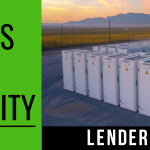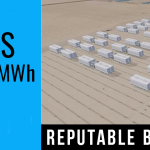Kyocera has officially launched a residential energy storage system using an advanced manufacturing process that supplier 24M claims can reduce some of the key costs of lithium battery making by as much as 50%.
The Japanese company’s new product, Enerezza, is aimed at the booming market in its homeland and is available in 5kWh, 10kWh and 15kWh capacities. Kyocera began pilot production of battery cells and systems in June using 24M’s proprietary production process, which uses electrodes typically 3-5 times thicker than in other lithium-ion batteries.
“Full-scale mass production” is set to begin in autumn 2020, while prior interviews between this site and 24M hinted at initial production volumes of around 100MW. A release sent to Japanese press by Kyocera in October 2019 claimed that initial output would be at around 20,000 residential Enerezza units annually.
Kyocera said previously that the units will address two key market segments: At-home self-consumption of solar PV-generated electricity in Japan (feed-in tariffs (FITs) awarded since 2009 expired last year while the more generous tariffs brought in since 2013 are declining rapidly), as well as being used for backup power.
An Energy-Storage.news interview last year with UK company Moixa, which supplies its GridShare software to battery energy storage units made and sold by Japanese company Itochu, found that the latter company – one among many providers in the domestic market – is selling around 10MWh of residential systems every month.
The need for backup power in a country which experiences as much as 10% of the world’s seismic activity each year, means that battery systems sold in Japan tend to be larger on average than devices sold purely for solar load shifting and self-consumption in other parts of the world.
‘A disruptor to the entrenched lithium-ion cell design and manufacturing process’
Meanwhile US-headquartered 24M has been developing its battery manufacturing process for commercialisation for some time. Back in 2015, this site wrote that the company was pursuing 50% cost savings over existing li-ion technology and aimed to hit US$100 per kWh cost of production by 2020. Analyst Lilia Xie at Lux Research blogged that 24M, spun out of A123 Systems in 2010, was “positioning itself as a disruptor to the entrenched lithium-ion (Li-ion) cell design and manufacturing process”. In March 2019, the company also claimed it had achieved energy densities exceeding 350Wh per kg.





